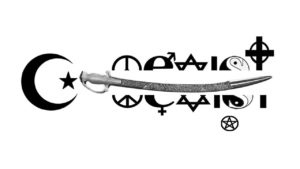
TL;DR: As a species, we used to need religion and other pleasant fictions in order to cope with the wild world that spawned us. Now that we Homo sapiens are the wildest threat on Earth, we need truth more than fiction. Religion was initially an adaptive invention of Homo sapiens. Eventually, religion became maladaptive, threatening our survival. We need to put aside dangerous religions, especially the monotheistic religion, since monotheism tends to breed violence.
We don’t know when, how, or why apes experienced a cognitive revolution and became sentient, conscious, so-called wise ape-people (Homo sapiens: “Wise man”). We do know that consciousness brought to the newly sentient Homo sapiens mental abilities which enabled the species to ultimately dominate the planet. Abstract ideas now became tools and weapons.
Contemplation of abstract ideas was a new tool unavailable to non-sentient species, but it came at a cost. Now the species could ponder death, not simply witness, grieve, and experience it. Now they could recognize violence, be impressed or disgusted by it, instead of just instinctively using it as another tool of survival. Now they could contemplate the meaninglessness of existence, and be crushed by it, or even driven insane by it. Unless, of course, they could find a way to cope with this unwelcome awakening.
(more…)


You must be logged in to post a comment.